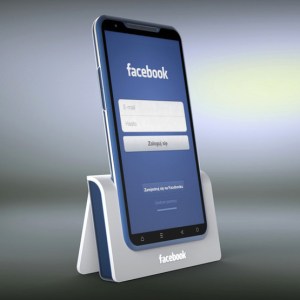Facebook Phone it may not be, but today we have one more example of how users will be able to use Facebook on their phones — and in place of traditional phone services. Today, multinational French carrier Orange announced that it would offer “Party Call,” a “social calling” service on the social network. Available on both mobile and desktop versions of the social network, users will be able to call each other, and make “group calls”, without needing to know or use each other’s mobile numbers to do it.
The deal was announced at Hello, and innovation event organized by Orange owner France Telecom. Party Call was described by the carrier today as “A partnership with Facebook, to introduce more communication tools into social networks, with a first public teleconference service coming in summer 2013.”
Orange will power the service, which it will run in conjunction with Orange’s new IP-based calling and messaging app, Libon (short for “life is better on,” one of the company’s slogans). Libon is available now as an iPhone app with an Android app coming in 2013.
Update: Orange has now been in touch to correct what it said earlier. Libon is not part of Party Calls; it is being powered by Orange independent of that. Libon may at some point be integrated into Facebook anyway, a spokesperson told me. Update 2: another story with more detail on how this will work is here [original article continues below]
An Orange spokesperson says that the Facebook social calling service will go live first in France in the summer of 2013. But France Telecom has a footprint that spans Europe and many emerging markets, so you can expect it to go beyond its home market borders. And because the service doesn’t rely on actual telephone numbers, it could even extend to markets beyond Orange owner France Telecom’s own footprint.
“This is about developing voice and innovating in social voice,” a spokesperson told me.
Facebook has seen other services come out that ride on the back of its social network to enable voice calls — for example Bobsled from T-Mobile in the U.S. That one, however, had to pull back from appearing like an official Facebook service (because it wasn’t).
This new deal with Orange looks like it will be much more integrated. But it still isn’t a Facebook-led offering as such: Orange is using Facebook’s open API, as A.N. Other developer would, to integrate the service with Facebook’s social graph. That means friends will be able to invite others, post details of the call to Facebook, and so on.
“By connecting its Party Call service to Facebook, Orange will be able to offer customers a truly personal experience. It is a great example of how companies can use Facebook’s open developer platform to make their products social. We are really happy that Facebook is transforming telecoms just as it has gaming, music, video and numerous other online services,” a Facebook spokesperson said.
France Telecom has made other moves to make its services more Facebook-friendly. They includes enabling Facebook on low-end mobile devices in Africa, as well as allowing carrier billing for Facebook apps and credits, turned on just this week in France.
We have heard from sources that will be more to come. In the last several months, some even have hinted to us that there is, indeed, a Facebook phone in the works — with none other than Orange. The spokesperson would not comment on that specifically but did note that Facebook and Orange are “friends”. “We have an ongoing relationship with them,” the spokesperson said.
If that relationship is more than that of just another big developer, Orange is an interesting partner, indeed. Not only would working with it give Facebook more experience in partnering with a carrier, but Orange is a key player in both the developed and emerging markets. That means that using the Orange route is a good way of trying out services in both. The latter will be an important geography for FB to target as it looks for the “next billion” users on its network.
For its part, Libon is Orange’s attempt to pick up new customers beyond those that it already has for its mobile services, available in markets like the UK, France, Spain and across Africa. Like Tu Me from Telefonica, the idea is to go to where users are communicating most today — on mobile, through apps, via free services — and also to expand to new geographic markets without the massive capital outlay that it takes to launch a full-scale mobile operation. It competes against services like Whatsapp and Skype, as well as those of other carriers — although like any app a user will need either cellular data connectivity or a WiFi network to use it.
The service runs on two tiers, one free and one premium (priced in the UK at £6.99) with the latter offering customized voice mail options, message transcriptions and the ability to call contacts who are not also on Libon.
The news of the Facebook partnership was announced earlier this morning at Hello, an innovation event being held by France Telecom in Paris, in which the company also announced a suite of other developments.
These include plans for super-fast network upgrades; an update to its Livebox Play IPTV and set-top box service; a new Orange Cloud service; and extension of NFC support to 20 new mobile devices; and the extension of a new single communications standard, joyn, used for video, file sharing, chat and other IP services. This is already live in Spain and in 2013 will be extended to Belgium, Poland, Romania, Slovakia and France.
